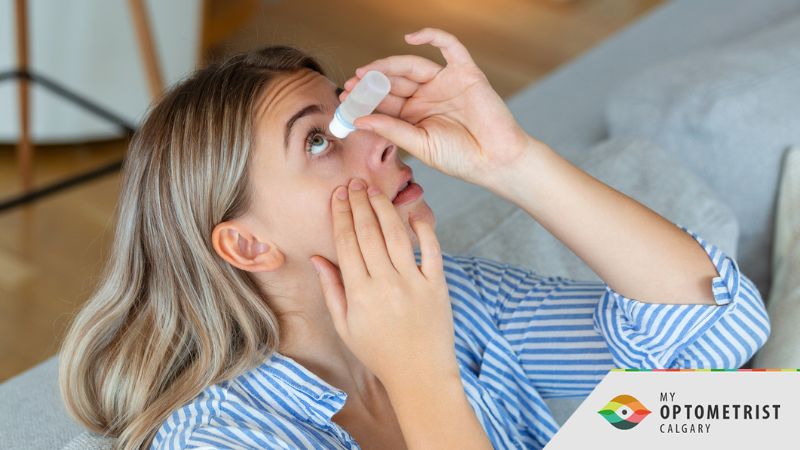
This blog explores effective strategies for contact lens wearers suffering from dry eyes, emphasizing the importance of selecting the appropriate lens type, such as hydrogel lenses or daily disposables, to enhance comfort. It highlights the critical role of maintaining rigorous lens hygiene to prevent irritation and dryness. The article also delves into the impact of environmental factors and lifestyle choices, suggesting the use of humidifiers in dry settings and advocating for regular screen breaks to alleviate eye strain. Additionally, it recommends the use of specialized eye drops or artificial tears, particularly those formulated for use with contact lenses, to provide immediate relief and maintain eye moisture. Overall, the blog provides comprehensive guidance to optimize eye health and comfort for those experiencing dry eyes while using contact lenses.
For many contact lens wearers, the joy of seeing the world without the encumbrance of glasses can sometimes be overshadowed by the discomfort of dry eyes. This condition, while common, can lead to a less than ideal experience for those who rely on contact lenses for their vision needs. Understanding and addressing the challenges of dry eyes when wearing contact lenses is not just about comfort; it's about maintaining the health and well-being of your eyes. In this blog, we'll explore some of the best practices for ensuring both comfort and eye health in the world of contact lenses.
Understanding the Relationship Between Contact Lenses and Dry Eyes
Contact lenses, by their very nature, can contribute to the sensation of dry eyes. They rest directly on the tear film, a delicate layer that coats the surface of the eye. For some, this can lead to a reduction in tear production or an increase in tear evaporation, leading to symptoms of dryness. It's essential to recognize this inherent relationship to effectively manage and mitigate the discomfort that comes with it.
Choosing the Right Type of Contact Lenses
One of the primary considerations in alleviating dry eyes is the type of contact lenses you use. Not all contacts are created equal, especially when it comes to their impact on eye moisture. Soft lenses, particularly those made from hydrogel materials, are often more comfortable for those with dry eyes. These lenses contain more water and allow more oxygen to pass through to the cornea, reducing the risk of dryness and irritation. Furthermore, daily disposable lenses can be a boon for dry eye sufferers. Since they are discarded after a single use, there's less chance for the build-up of deposits that can exacerbate dryness and discomfort.
Maintaining Proper Lens Hygiene
Lens hygiene plays a critical role in managing dry eyes. Lenses that are not properly cleaned and cared for can accumulate deposits and bacteria, leading to increased irritation and dryness. It's crucial to follow your optometrist's instructions for cleaning and storing your lenses. Using the right cleaning solutions and regularly replacing your lens case can prevent the accumulation of irritants that lead to dryness. Remember, a clean lens is a comfortable lens.
Managing Your Environment and Lifestyle
Your surroundings and lifestyle choices can significantly impact the severity of dry eye symptoms while wearing contact lenses. Environments that are dry, windy, or filled with smoke and pollutants can exacerbate the problem. Using a humidifier, especially in dry indoor environments, can help maintain moisture levels and alleviate eye dryness. Moreover, take breaks during long periods of screen time to reduce eye strain and dryness. It's also beneficial to blink more frequently, as blinking helps to spread tears evenly across the surface of the eye, providing necessary lubrication and relief.
Supplementing with Eye Drops and Artificial Tears
The use of eye drops or artificial tears can provide immediate relief for dry eyes in contact lens wearers. These products help to supplement your natural tear production, keeping the eyes moist and comfortable. It's important, however, to choose the right type of eye drops. Some are specifically formulated for use with contact lenses and can be applied while the lenses are in your eyes. Always consult with your optometrist before adding any eye drops to your routine to ensure they are compatible with your lenses and won't affect your eye health.
Living with dry eyes as a contact lens wearer can be challenging, but it's not insurmountable. By understanding the interaction between contact lenses and your eyes, choosing the right type of lenses, maintaining proper lens hygiene, managing your environment, and supplementing with eye drops, you can significantly improve your comfort and eye health. It's about finding the right balance and routine that works for your specific needs. Remember, if dry eye symptoms persist, it's always best to consult with your optometrist. They can provide personalized advice and solutions to ensure that your vision and comfort are optimized, allowing you to enjoy the clarity and freedom that contact lenses offer without the discomfort of dry eyes.
Written on behalf of My Optometrist Calgary.
FAQs
Q: Should I consult an optometrist for dry eyes from contact lenses?
A: Yes, it's important to consult with an optometrist. They can provide personalized advice and solutions, including recommending specific lens types or treatments for your dry eyes.
Q: What type of contact lenses are best for dry eyes?
A: Soft hydrogel or silicone hydrogel lenses, which are more breathable and retain moisture better, are often recommended for those with dry eyes.
Q: What causes dry eyes in contact lens wearers?
A: Dry eyes in contact lens wearers can be caused by reduced tear production, increased tear evaporation, or irritation from the lenses themselves, often exacerbated by environmental factors and screen time.